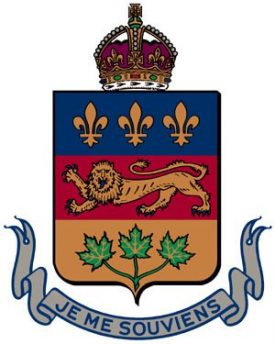Academics
Academics

Why Study Quebec?
Meaning “where the river narrows”, Quebec is the chief French speaking region of the Americas. French, a symbol of both its national identity and of its colonial past, mixes with indigenous heritages and integrates English-speaking influences from North America; since 1974 immigration has also promoted a large allophone population. French is the native language of close to 80% of Quebecers; English about 8%; allophone speakers represent 12% of the population, of which 3.6 % are of indigenous ancestry.
Situated in the northeast of North America, between Ontario and the Atlantic provinces, Quebec shares its southern border with the United States (New York, Vermont, New Hampshire and Maine). The Saint-Lawrence River runs through Quebec, connecting the Great Lakes to the Atlantic Ocean. With an area of 1,667, 441 km2 (643, 802 mi²), it’s the biggest Canadian province. Although Quebec City is the capital, Montreal is the most populated city (1,902,080 inhabitants).
In addition to traditional goods (energy, wood and agricultural products), since the end of the 20th century, certain Quebec businesses have conquered a considerable part of the global market; 4th largest producer of aluminum (Alcan, Alcoa) and the 4th largest producers of biotechnology and in the pharmaceutical industries. Having some of the most innovative aerospace industries (Bombardier, Hérous-Devtek, etc), Quebec represents 60% of the aeronautic production in Canada. Since the arrival of Softimage (1986), Quebec became the center of production and distribution of entertainment software (Activision, Ubisoft, Safbakan, etc). International exports represent 60.4% of Quebec’s total exports while interprovincial ones represent only 39.6%. The United States is the primary commercial partner of Quebec, receiving 72.2% of international exports (other exports going to: Europe 14.4%, Asia 5.1%, the Middle-East 2.7%, Central America 2.3%, South America 1.9%, Africa .8%, and Oceana .7%).
Tourism is one of the main sources of revenue for Quebec. In 2007, Quebec welcomed 25.8 million tourists of which 7.7 % came from the United States. The City of Quebec is classified as a UNESCO World Heritage Site. The Quebec cultural industry is dynamic and has a strong international presence. Quebec heritage is rich in music, cinema, literature and theatrical tradition. Directors such as Claude Jutra, Denys Arcand, and Gilles Carle have received international accolades which have enabled them to make the transition from domestic to international directors. The internationalization of Quebec songs began in the 1950s and 60s with Félix Leclerc, Gilles Vigneault, and Robert Charlebois, this process reached fruition through the efforts of Celine Dion and Starmania, the most famous French musical, written by Luc Plamondon. The Cirque du Soleil, founded by Guy Laliberté and Gilles Ste-Croix, and having modest beginnings in Baie-Saint-Paul in 1984, is now the an artistic creation of global proportions with simultaneous shows in Paris, Las Vegas, Montreal, London, Moscow, etc. The poems of Nelligan, Miron, Blais, des Rosiers are essential components of a well-composed French curriculum, as well as the novels of Michel Tremblay, Dany Laferrière, Monique Proulx, Yin Cheng, Jacques Godbout, Réjean Ducharme, Anne Hébert, Gabrielle Roy, Nicole Brossard, Marie-Claire Blais, Nelly Arcan, and many more…
For these reasons, it is crucial to have a better understanding of Quebec, our unknown neighbors to the North.
Courses
Previously offered undergraduate courses
FR 339: “Contemporary Quebec: literature, culture and film”
- Fall 2015, Instructor: Jean-Jacques Thomas
- FR 339 will be cross-listed in Canadian Studies under CDN 481.
- Click here for more information and a description of the course.
- Quebec and the Francophone areas of the New World will be studied both locally and globally so as to study it as a diverse and complex macrocosm of varied cultural interests and identities. Special emphasis will be given to literature, arts, performing arts, film and the Francophone video culture (In English).
- Although taught in English, this course does count towards the French major or minor.
HIS 426: “History of Quebec”
- Fall 2015, Instructor: Liana Vardi
- Click here for more information and a description of the course.
- This course covers four centuries at a gallop, focusing on the issue of nationalism, how it arose in Quebec, how it developed and changed over time.
- Taught in English
FR 481 Selected Topics:
- Spring 2013 Québec Littérature et Culture http://www.ieeff.org/ubfr481s13.html
- Spring 2011 French in the New World
Graduate courses
- FR 524 Théâtre québécois depuis 1960
- FR 525 French in the New World



 French
French